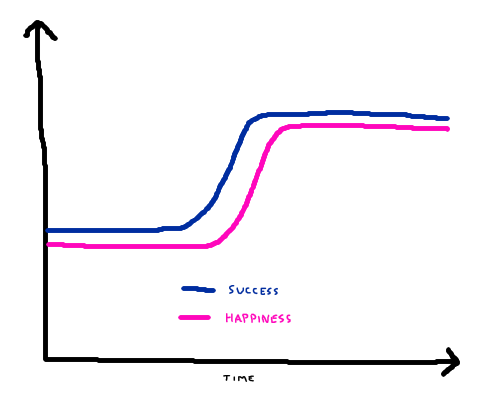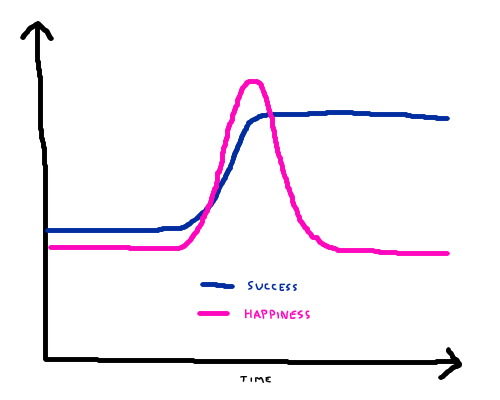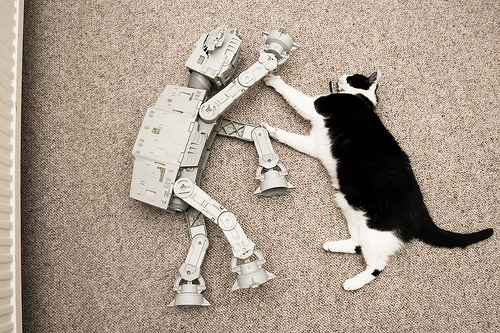TOM FRANCIS
REGRETS THIS ALREADY
Hello! I'm Tom. I'm a game designer, writer, and programmer on Gunpoint, Heat Signature, and Tactical Breach Wizards. Here's some more info on all the games I've worked on, here are the videos I make on YouTube, and here are two short stories I wrote for the Machine of Death collections.
Theme
By me. Uses Adaptive Images by Matt Wilcox.
Search
Analysing Happiness
This is a series of reminders to my future self about what I’ve figured out about happiness. The gist of the last one was basically this:
The reason we want things isn’t that they’ll make us happy.
Often, getting what you want does give you a little rush of happiness. We can be fooled into thinking this is the sensation of having that thing. In fact, of course, it’s the sensation of getting it. We are feeling the change in our status, not its new level. Which is why it fades.
We expect this relationship:

But we get something more like this:

As a long-term strategy for pursuing happiness, you can see chasing success clearly isn’t going to work. You’d have to be consistently improving your lot to stay happy, and if you ever hit your potential, you’d flatline. This type of happiness – you could call it Gain Happiness – is fleeting.
One consolation is that the reverse is true: if a major loss doesn’t have recurring consequences, you only feel it temporarily. Before long, you’re back to your previous level of happiness even if you’re worse off. A study in the Journal of Personality & Social Psychology (PDF) explored the subjective well-being of 118 people over two years, and found that neither positive nor negative events had a lasting effect on their reported happiness beyond three to six months.
So Gain Happiness is hard to gain, but Loss Misery is easy to lose. We’re surprisingly stable. Within that, how do we get happier? Here’s what I have so far:
1. Be ruthless about getting away from sources of misery.
I can’t help you with this, but it’s worth acknowledging its importance. I’ve only talked about what happens in the positive bit of the happiness chart – if you’re actively unhappy and there’s an external cause, obviously getting permanently away from it is your only priority.
For me, the only times I’ve been truly unhappy have been when I was living with people I didn’t like. Once I managed to get away, every type of happiness got a hell of a lot easier.
Disclaimer: try not to kill anyone.
2. Do something because you enjoy the process, not the result.
Ideally for a living. There are two particularly great things about my job: writing, and feedback. If feedback was the only one I enjoyed, I’d be miserable.
It’s the result, and if you’re anything like me, getting a great result makes a good one disappointing. It’s Gain Happiness with ever-increasing expectations, which leads to a constant war of neuroses. You can’t let your happiness be dependent on something like that.
Luckily, I love writing. Before we launched the site in June last year, I didn’t get that much feedback on what I wrote – people don’t write to a magazine as readily as they comment on a blog. But I already loved my job, because I love the process.
3. Do what you want to be in the mood to do.
Often you’re not angry or sad because of the thing you’re angry or sad about. You’re just in a bad mood. I’ve found if I pay attention to what mood I’m in, it’s amazingly easy to snap out of it.
In my case, I can just watch something funny – I’ve never been angry while Flight of the Conchords is on. And like everyone, I have mood amnesia: the moment I’m out of a bad mood, it’s forgotten.
But it’s even more powerful than this. You can also get stuff done that you don’t feel like doing, just by starting to do it. Your brain only resists up until the point you actually start the job, at which point it starts to focus on doing it. You do what you want to be in the mood to do, and soon you’re in the mood to do it.
It sounds ridiculous, but it’s the single most useful piece of information I’ve discovered about the way my brain works in 29 years of having one.
